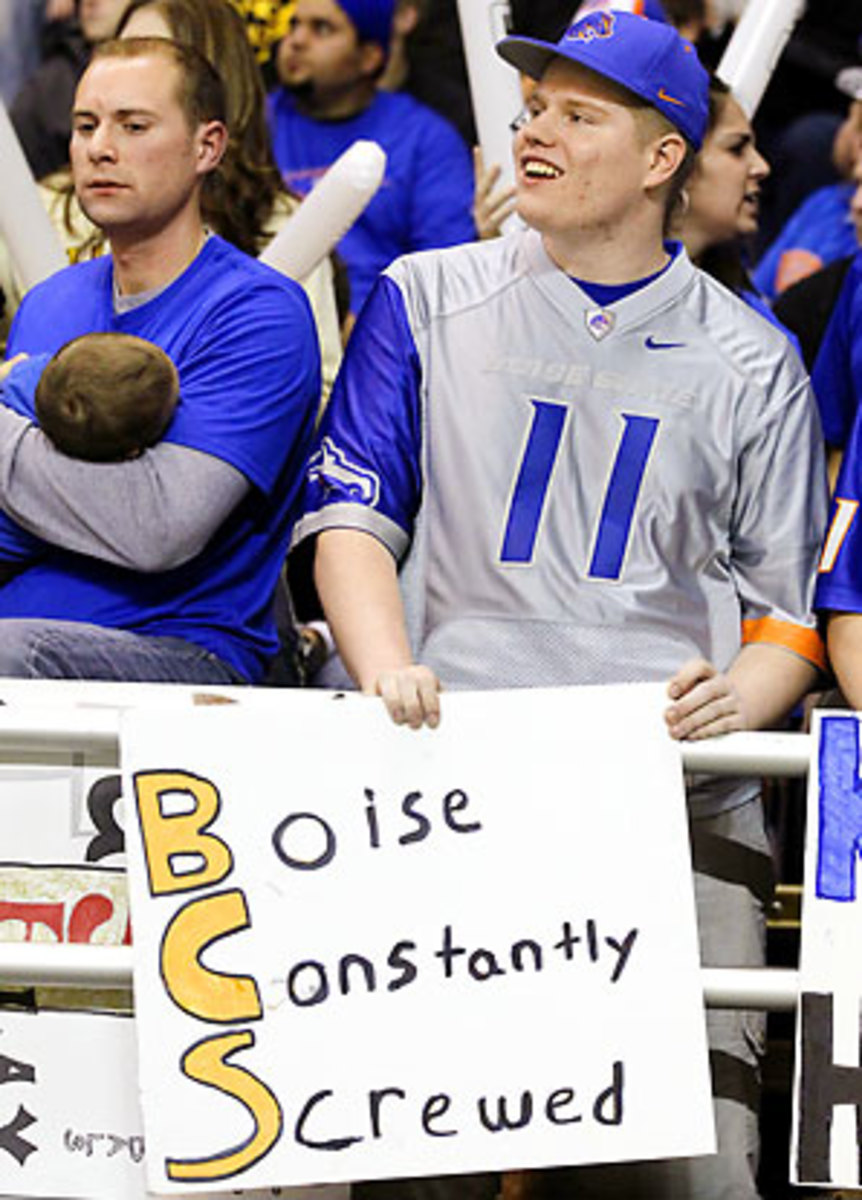Celebrate V-BCS Day now, worry about playoff details tomorrow
HOLLYWOOD, Fla. -- BCS executive director Bill Hancock cut me off Thursday as I asked a question about most conference commissioners' refusal to consider a "four-team event" four years ago.
"Playoff," Hancock said. "Let's call it a playoff."
Yes. Let's.
College football's leaders crossed the Rubicon on Thursday when they decided that the only options they will present to university presidents are four-team playoff models. Though Hancock and the commissioners insisted nothing is final until the presidents sign off, we all know they wouldn't have gone out on this limb without confidence that the presidents will adopt one of the four-team options presented. If they didn't believe a playoff was going to happen, they wouldn't even utter the word.
So happy V-BCS Day. Now is a time to rejoice. College football, the greatest sport on earth, is about to get even better because it finally will have a playoff beginning with the 2014 season. "If this happens," Hancock said, "it will be a seismic change."
Unfortunately for the 11 commissioners and Notre Dame athletic director Jack Swarbrick, their work is far from over. They have agreed to stage a playoff. They have agreed to call it a playoff. "I've always distinguished a four-team playoff that could fit within the existing calendar from a 16-team NFL style playoff," SEC commissioner Mike Slive said. "It was easier to say that earlier, but now we're all using that word, so what the heck?"
So what do college football's leaders have to do now? Everything else.
They must decide whether the semifinal games will be played on campus, in bowls or at non-bowl neutral sites. They must decide whether to only allow in conference champions. They must decide how the four teams are selected. They must decide how to divide the money.
In the next few weeks, commissioners will take the models to their presidents. The first debates will encompass the location of the semifinal games. At the same time, presidents also will discuss the conference-champion issue. Presidents in each league will vote in the next few weeks on their preference of semifinal locations. (Expect a heavy push for bowl-based semis.) They'll also vote on whether the playoff would include the top four conference champions, the top four teams or some mix of the two.
Once the presidents vote, the conference commissioners will come back together in June and hammer out a compromise that makes the most leagues happy. At the same time, presidents and commissioners also must decide how to package the bowls with the playoff. Do they add another bowl -- such as the Cotton -- to the top echelon of games?
One thing is certain: The concept of the Automatic Qualifying conference is dead, and so is the rule that limits conferences to a maximum of two teams in the top bowls. That is terrible news for the Big East, which used its AQ status to lure several new programs after Pittsburgh, Syracuse and West Virginia announced their intentions to leave the conference. It is bittersweet news for the former non-AQ leagues. They no longer have to worry about schools leaving to chase AQ status, but they also gave up the bowl access points for which they fought over the past 10 years. With the exception of the Rose Bowl, which prefers a Big Ten-Pac-12 matchup, the bowls may opt for an open-market system that should produce better matchups than the rigid rules that governed the BCS.
That is the minimum that leaders must accomplish, because commissioners must have a format and a bowl package to sell to television networks. The negotiating window opens in October, but the plan is to have these issues settled sometime in July.
The two most difficult discussions don't have to be settled in time for television negotiations. That's fortunate, because the debates over how to select the teams and how to split the money will be the real rock fights.
Pac-12 commissioner Larry Scott said the team-selection issue could clear up a little after leaders choose a model. "We can probably get to that after we determine the format," Scott said. "And once we determine the model, it might influence people's views on how important it is to go one way or another. But it's clear there is no consensus."
What isn't clear is how long either of those discussions will take. "I think people think we're just idiots sometimes that we can't figure this out more quickly," Notre Dame's Swarbrick said. "This is incredibly complex stuff. You've got 12 parties and an infinite number of variables."
Contrary to everything I've written the past few years, they aren't idiots. At least not anymore. They finally listened to you. A playoff is coming.
Celebrate today. Worry about the details tomorrow.






